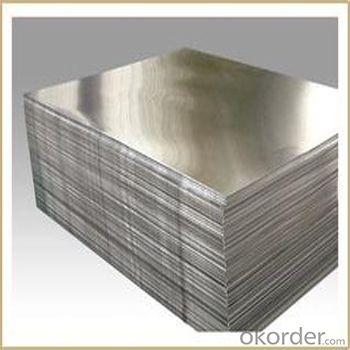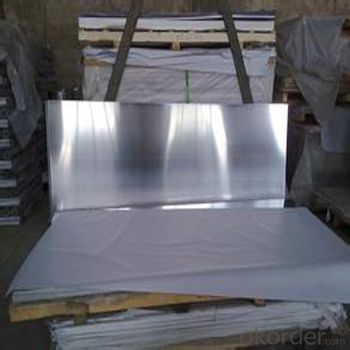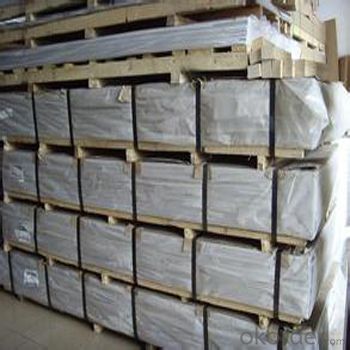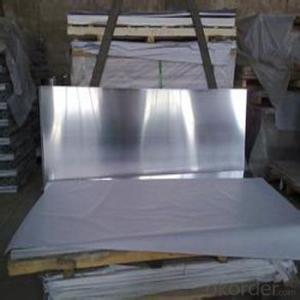AA5005 Aluminium Sheet Mill Finish CC and DC
- Loading Port:
- Shanghai
- Payment Terms:
- TT OR LC
- Min Order Qty:
- 5 m.t.
- Supply Capability:
- 1000 m.t./month
OKorder Service Pledge
OKorder Financial Service
You Might Also Like
Item specifice
Alunimiun Sheet
ALLOY:AA5*** (AA5052,AA5083,AA5754 etc)
TEMPER: H14,H16,H18,H22,H24,H26,H32,O/F
THICKNESS: 0.2mm-100mm
WIDTH: 30mm-1700mm
STANDARD: GB/T 3880-2006
Special specification is available on customer's requirement
2. Description
With excellent corrosion resistance and weldability, together with high strength, this alloy was designed for welded structures requiring maximum joint strength and efficiency. Can be anodized for increased corrosion resistance, but does not lend itself to decorative applications. Not meant to be a machining alloy, but can be machined fairly well with proper preparations. Because of its relatively high magnesium content, the workability rating would only be fair. Non-heat treatable. Typical applications include large marine craft, containers, railroad cars, structurals and elevator cars.
3. Advantage
Good quality!
4. Pictures



5.FAQ:
1)what is aluminum?
Aluminium (or aluminum; see spelling differences) is a chemical element in the boron group with symbol Al and atomic number 13. It is a silvery white, soft, nonmagnetic, ductile metal. Aluminium is the third most abundant element (after oxygen and silicon), and the most abundant metal in the Earth's crust. It makes up about 8% by weight of the Earth's solid surface.
Aluminium metal is so chemically reactive that native specimens are rare and limited to extreme reducing environments. Instead, it is found combined in over 270 different minerals.The chief ore of aluminium is bauxite.
2)What's kind of payment term we can supply?
CIF,CFR, FOB and other.
3)Can we supply samples?
Yes, we can!
- Q:What is the maximum temperature resistance of aluminum coils?
- Various factors, including alloy composition, purity, and specific application, determine the maximum temperature resistance of aluminum coils. Generally, aluminum has a low melting point of approximately 660 degrees Celsius (1220 degrees Fahrenheit). As a result, the temperature resistance of aluminum coils typically falls between 200 and 400 degrees Celsius (392 to 752 degrees Fahrenheit). Exceeding these temperatures may lead to structural alterations in aluminum, such as softening or deformation, which could affect its performance and integrity. Consequently, it is crucial to consider the specific demands and limitations of the application when determining the maximum temperature resistance of aluminum coils.
- Q:What is the formula to calculate the wall thickness of aluminum coil?
- Aluminum coil thickness*aluminum coil width*aluminum coil curl*aluminum density (the density of aluminum alloy: 2.73, the density of pure aluminum: 2.71)
- Q:What are the weight ranges of aluminum coils?
- The weight ranges of aluminum coils can vary depending on the specific application and industry. However, in general, aluminum coils can range from a few hundred pounds to several thousand pounds in weight.
- Q:Can aluminum coils be used for solar panel applications?
- Solar panel applications can utilize aluminum coils, which are lightweight and durable materials commonly employed in solar panel construction. Aluminum, an excellent conductor of electricity, is ideal for capturing and conducting solar energy. These coils can serve as backing materials for solar panels, offering structural support and aiding in heat dissipation. Furthermore, aluminum possesses good corrosion resistance, a crucial characteristic for solar panels exposed to diverse weather conditions. Ultimately, the strength, conductivity, and corrosion resistance of aluminum coils render them a favored choice for solar panel applications.
- Q:hey, my dad and i are working on painting our front door and the current piece of aluminum in front of it wont go with the new color. it doesnt look like it can be changed out so we are wondering, other than spray paint, what can you put on aluminum to make it turn permanently black. my dad mentioned gun blue, but that only works on steel. thanks
- Aluminum okorder / You could take it to someone that powder coats metals.
- Q:hello I'm building a TIG welder and have found the output from my stick welders to be not so good for aluminum(60 Hz on one). I've heard that high frequency AC is the way to do AL but am not sure what constitutes high. I do have a nice miller gas driven welder also that is maybe triple the frequency of my line driven one but still had issues with it. does anyone know of an actual # ? I may be able to build an inverting PWM supply eventually to do this but am not sure what I would need it to do. does anyone have any data that might help? any data/tips about aluminum would be appreciated, thanks in advance. FYI I do understand why AC works so much better on AL, what with the oxides that are always present.
- The High Frequency used in aluminum is for the starting and stabilizing of the ac wave. All the h/f will do is allow you to start the arc without touching the tungsten to the work and stabilize the arc itself. The h/f does not pertain to the alternating current frequency (50 - 60 Hz). The ac current does the cleaning of the aluminum to some degree (not eliminating proper prep and cleaning before weld). You could buy a high freq add on unit that could help, check with your local welding supplier or look it up on line. Edit -- Here's a thought go to some of the welding power supply websites and find a manual on a tig machine and see if they have a schematic on the high freq. hidden within the service manual. You could then get an idea of how they did it.
- Q:What is the typical lead time for manufacturing aluminum coils?
- The typical lead time for manufacturing aluminum coils can vary depending on various factors such as the complexity of the order, the quantity required, and the current demand in the market. However, on average, it can range from a few weeks to a couple of months.
- Q:Are aluminum coils suitable for electrical transformers?
- Yes, aluminum coils are suitable for electrical transformers. They have several advantages, including lower cost, lighter weight, and better thermal conductivity compared to copper coils. Additionally, aluminum coils have been widely used in power transformers, demonstrating their suitability for this application.
- Q:How are aluminum coils protected against scratches and damage?
- Aluminum coils are protected against scratches and damage through several methods. One common method is the application of a protective coating or film on the surface of the coil. This coating serves as a barrier between the coil and any potential sources of damage, such as abrasion or impact. Another way to protect aluminum coils is by using a process called coil coating. In this process, the coil is cleaned, pre-treated, and coated with a layer of protective paint or resin. This coating not only enhances the appearance of the coil but also provides a protective layer against scratches and other forms of damage. Additionally, during the manufacturing and handling process, aluminum coils are often wrapped or packaged in materials that provide cushioning and protection. This helps to prevent any scratches or dents that may occur during transportation or storage. Lastly, proper handling and storage practices play a crucial role in protecting aluminum coils against scratches and damage. It is important to handle the coils with care, using appropriate equipment and techniques to minimize the risk of scratching or other forms of damage. Storing the coils in a clean and dry environment can also help prevent any potential damage. Overall, a combination of protective coatings, coil coating processes, proper handling, and storage practices ensures that aluminum coils are well-protected against scratches and damage, maintaining their quality and appearance.
- Q:Can aluminum coils be used in marine or saltwater environments?
- Yes, aluminum coils can be used in marine or saltwater environments. Aluminum is known for its excellent corrosion resistance, making it a suitable material for various marine applications. The oxide layer that naturally forms on the surface of aluminum provides a protective barrier against saltwater and other corrosive elements. This oxide layer can be further enhanced through processes like anodizing or painting, which increases its resistance to corrosion. Additionally, aluminum coils are lightweight, which makes them advantageous for marine applications where weight reduction is desired. Overall, aluminum coils are a popular choice in marine and saltwater environments due to their corrosion resistance and lightweight properties.
1. Manufacturer Overview |
|
|---|---|
| Location | |
| Year Established | |
| Annual Output Value | |
| Main Markets | |
| Company Certifications | |
2. Manufacturer Certificates |
|
|---|---|
| a) Certification Name | |
| Range | |
| Reference | |
| Validity Period | |
3. Manufacturer Capability |
|
|---|---|
| a)Trade Capacity | |
| Nearest Port | |
| Export Percentage | |
| No.of Employees in Trade Department | |
| Language Spoken: | |
| b)Factory Information | |
| Factory Size: | |
| No. of Production Lines | |
| Contract Manufacturing | |
| Product Price Range | |
Send your message to us
AA5005 Aluminium Sheet Mill Finish CC and DC
- Loading Port:
- Shanghai
- Payment Terms:
- TT OR LC
- Min Order Qty:
- 5 m.t.
- Supply Capability:
- 1000 m.t./month
OKorder Service Pledge
OKorder Financial Service
Similar products
New products
Hot products
Related keywords




























